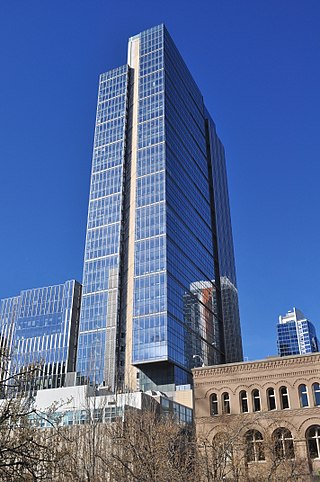A real estate investment trust is a company that owns, and in most cases operates, income-producing real estate. REITs own many types of commercial real estate, including office and apartment buildings, warehouses, hospitals, shopping centers, hotels and commercial forests. Some REITs engage in financing real estate.

The National Association of Realtors (NAR) is an American trade association for those who work in the real estate industry. As of December 2023, it had over 1.5 million members, making it the largest trade association in the United States including NAR's institutes, societies, and councils, involved in all aspects of the residential and commercial real estate industries. The organization holds a U.S. trademark over the term "Realtor". NAR also functions as a self-regulatory organization for real estate brokerage. The organization is headquartered in Chicago.

Eviction is the removal of a tenant from rental property by the landlord. In some jurisdictions it may also involve the removal of persons from premises that were foreclosed by a mortgagee.

In common law systems, land tenure, from the French verb "tenir" means "to hold", is the legal regime in which land "owned" by an individual is possessed by someone else who is said to "hold" the land, based on an agreement between both individuals. It determines who can use land, for how long and under what conditions. Tenure may be based both on official laws and policies, and on informal local customs. In other words, land tenure implies a system according to which land is held by an individual or the actual tiller of the land but this person does not have legal ownership. It determines the holder's rights and responsibilities in connection with their holding. The sovereign monarch, known in England as the Crown, held land in its own right. All land holders are either its tenants or sub-tenants. Tenure signifies a legal relationship between tenant and lord, arranging the duties and rights of tenant and lord in relationship to the land. Over history, many different forms of land tenure, i.e., ways of holding land, have been established.
Housing Development Finance Corporation was an Indian private sector mortgage lender based in Mumbai. It was the biggest housing finance company in India. It also had a presence in banking, life and general insurance, asset management, venture capital and deposits through its associate and subsidiary companies.
Property management is the operation, control, maintenance, and oversight of real estate and physical property. This can include residential, commercial, and land real estate. Management indicates the need for real estate to be cared for and monitored, with accountability for and attention to its useful life and condition. This is much akin to the role of management in any business.

The Urban Land Institute, or ULI, is a global nonprofit research and education organization with regional offices in Washington, D.C., Hong Kong, and London. ULI aims to help its members and their partners build more equitable, sustainable, healthy and resilient communities.

Zillow Group, Inc., or simply Zillow, is an American tech real-estate marketplace company that was founded in 2006 by Rich Barton, Zillow's current CEO, and Lloyd Frink, former Microsoft executives and founders of Microsoft spin-off Expedia; Spencer Rascoff, a co-founder of Hotwire.com; David Beitel, Zillow's current chief technology officer; and Kristin Acker, Zillow's current technology leadership advisor.
Move, Inc. is a real estate listing company based in Santa Clara, California. The company operates the Move Network of real estate websites, the largest of which is Realtor.com. Move has a longstanding partnership with the National Association of Realtors, the real estate industry's largest trade association, for operating Realtor.com.

The 2005 Chinese property bubble was a real estate bubble in residential and commercial real estate in China. The New York Times reported that the bubble started to deflate in 2011, while observing increased complaints that members of the middle-class were unable to afford homes in large cities. The deflation of the property bubble is seen as one of the primary causes for China's declining economic growth in 2013.
Real estate in China is developed and managed by public, private, and state-owned red chip enterprises.

Realtor.com is a real estate listings website operated by the News Corp subsidiary Move, Inc. and based in Santa Clara, California. It is the second most visited real estate listings website in the United States as of 2021, with over 100 million monthly active users.

NBCC (India) Limited, formerly known as National Buildings Construction Corporation is a public sector undertaking (PSU) company under the Ministry of Housing and Urban Affairs, Government of India.
Real estate in Pakistan is a growing sector of the economy of Pakistan.
Raheja Developers Limited, (RDL), formerly Raheja Developers Private Limited, is an Indian real estate development company with its headquarters in Delhi, India.
Magicbricks, a division of Times Internet Limited, a wholly owned subsidiary of Bennett, Coleman & Co. Ltd is a website that provides a common platform for property buyers & sellers to locate properties of interest in India, and source information about all property related issues.
Niranjan Hiranandani is an Indian billionaire businessman, co-founder and managing director of Hiranandani Group, engaged in real estate business. He is ranked by Forbes among the 100 richest Indians, with a net worth of US$1.6 billion as of June 2021.
Real estate is property consisting of land and the buildings on it, along with its natural resources such as growing crops, minerals or water, and wild animals; immovable property of this nature; an interest vested in this (also) an item of real property, buildings or housing in general. In terms of law, real relates to land property and is different from personal property while estate means the "interest" a person has in that land property.

Greystar Real Estate Partners is an international real estate developer and manager based in the United States. As of 2023, Greystar had over $76 billion in gross assets under management, and operated in 17 countries.
The Canadian property bubble refers to a significant rise in Canadian real estate prices from 2002 to present which some observers have called a real estate bubble. The Dallas Federal Reserve rated Canadian real estate as "exuberant" beginning in 2003. From 2003 to 2018, Canada saw an increase in home and property prices of up to 337% in some cities. In 2016, the OECD warned that Canada's financial stability was at risk due to elevated housing prices, investment and household debt. By 2018, home-owning costs were above 1990 levels when Canada saw its last housing bubble burst. Bloomberg Economics ranked Canada as the second largest housing bubble across the OECD in 2019 and 2021. Toronto scored the highest in the world in Swiss bank UBS' real estate bubble index in 2022, with Vancouver also scoring among the 10 riskiest cities in the world. The Royal Bank of Canada analysis showed that Canadian housing had become the least affordable that it had ever been. By 2023 Canada’s nonfinancial debt exceeded 300% of GDP and household debt surpassed 100% of GDP, both higher than the levels seen in the United States before the 2008 global financial crisis. Canada's housing investment as a percentage of GDP ratio peaked at 8.9% in 2022, whereas the US at the peak of the housing bubble only reached 7% in 2006.









